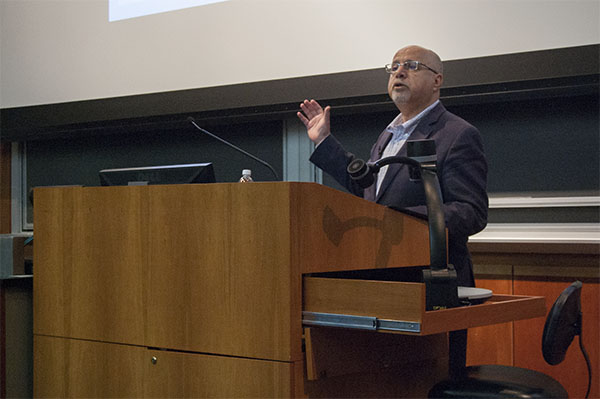

The Israeli-Palestinian conflict is the defining issue that shapes how Arabs view the world and America in particular, University of Maryland Professor Shibley Telhami said.
“It’s what I call the prism of pain through which Arabs see the United States,” Telhami said. “It’s inescapable even in the midst of all that is happening in the Middle East.”
Telhami spoke to a New Paltz audience on Monday at a lecture, “The Peace Puzzle: America’s Quest for Arab-Israeli Peace, 1989-2011,” which took place in the Coykendall Science Building.
The lecture was organized by the World Affairs Council of the Hudson Valley in collaboration with the New Paltz political science department.
“It was good that the lecture was about finding solutions to the conflict because in the news there really isn’t talk about finding solutions, most of the focus is on the conflict,” Soraya Gooya, a first-year International Relations major, said.
Sevgin Oktay, the vice president of the World Affairs Council of the Hudson Valley, said his group’s mission is to expose the American public to the intricacies of world affairs.
“To understand what’s really going on in the Arab world, we really need to understand what they feel, think and see,” Oktay said.
Telhami, a professor of international relations, has served as an advisor to the United States’ diplomatic mission to the United Nations. Telhami, an expert in the field, has been collecting annual public opinion surveys from Egypt, Jordan, Lebanon, Morocco, Saudi Arabia and the United Arab Emirates every year since 2003.
In 2011, 55 percent of those surveyed said they were more optimistic about the future of the Arab world in light of the Arab Spring, while only 16 percent were pessimistic, according to the surveys.
“A majority feel that the Arab Spring is mostly about ordinary people seeking dignity, freedom and a better life,” Telhami said. “However, if Arabs are seeking dignity in the world, the Arab-Israeli conflict is dignity’s antithesis.”
Telhami found that this sense of optimism didn’t carry over to the Israeli-Palestinian issues.
While 67 percent of those surveyed in Arab countries said that they’re prepared for peace with Israel based on a two-state solution, 53 percent of Arabs and 49 percent of Israelis said that such a solution will never happen.
“If you really don’t believe it’s going to happen then you’re not likely to do any real compromising,” Telhami said. “Why would you compromise if you’re preparing yourself for the inevitable conflict, preparing yourself for failure?”
Negotiations for a peace settlement resumed between Israeli and Palestinian leaders in July. Parties from the two sides have met seven times since then, according to Reuters.
Telhami said the Obama administration needs to be more attentive for the settlement to succeed.
“This is above the paygrade of a special envoy,” Telhami said. “It requires the President of the United States.”
